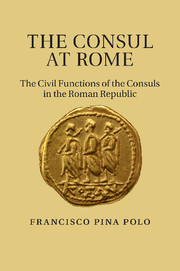Book contents
- Frontmatter
- Contents
- List of illustrations
- Acknowledgements
- Introduction
- PART I THE CONSULAR FUNCTIONS IN THE PRE-SULLAN AGE (367–81)
- 1 The consuls taking office
- 2 Consuls and civic religion
- 3 Consuls, the agents of diplomacy in the Roman state
- 4 Communication between the consuls and the people: edicts and contiones
- 5 Consuls as legislators
- 6 The jurisdiction of the consuls
- 7 Consuls as promoters of public works
- 8 Colonization and distribution of land
- 9 Appointment of a dictator
- 10 Consuls presiding over elections
- 11 The consular year in the pre-Sullan age
- PART II THE CONSULAR FUNCTIONS IN THE POST-SULLAN AGE (80–50)
- 15 Conclusion
- Bibliography
- Index of Subjects
- Index of Ancient Sources
- Index of Ancient Personal Names
7 - Consuls as promoters of public works
Published online by Cambridge University Press: 25 October 2011
- Frontmatter
- Contents
- List of illustrations
- Acknowledgements
- Introduction
- PART I THE CONSULAR FUNCTIONS IN THE PRE-SULLAN AGE (367–81)
- 1 The consuls taking office
- 2 Consuls and civic religion
- 3 Consuls, the agents of diplomacy in the Roman state
- 4 Communication between the consuls and the people: edicts and contiones
- 5 Consuls as legislators
- 6 The jurisdiction of the consuls
- 7 Consuls as promoters of public works
- 8 Colonization and distribution of land
- 9 Appointment of a dictator
- 10 Consuls presiding over elections
- 11 The consular year in the pre-Sullan age
- PART II THE CONSULAR FUNCTIONS IN THE POST-SULLAN AGE (80–50)
- 15 Conclusion
- Bibliography
- Index of Subjects
- Index of Ancient Sources
- Index of Ancient Personal Names
Summary
Throughout the Republican period, public works were mostly at the initiative and under the control of the censors from the time when the censorship was established, and to a lesser extent in the hands of the aediles, who were in charge of the care of the city (cura urbis). To this end, the censors received from the quaestors the sums of money that the senate had allocated to the planned public works, and they were responsible for letting the corresponding contract (locatio). In fact, most of the known public works of the Republican period (aqueducts, buildings for public shows, basilicas, etc.) were promoted by the censors. However, the consuls – and other magistrates – were also involved in the promotion of public works, particularly with regard to the construction of temples and roads, as well as, to a lesser degree, commemorative buildings or other works which were promoted personally by certain consuls. One of the reasons why the consuls undertook public works was that the censors were elected every five years and had a term of office of eighteen months, which meant that, should this have been the exclusive authority of censors, it would have been impossible for a period of three and a half years to start any public works through the necessary locatio. Consequently, as in the case of the censors, the consuls also had the authority to let the contract and therefore to avail themselves of public money to finance the corresponding works.
- Type
- Chapter
- Information
- The Consul at RomeThe Civil Functions of the Consuls in the Roman Republic, pp. 135 - 168Publisher: Cambridge University PressPrint publication year: 2011



